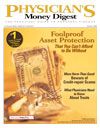Publication
Article
The Number-one Myth of Asset Protection
Author(s):
Any doctor in this country can tell you that themalpractice crisis is reaching epic proportions,and many doctors have been left fearingfor their livelihood. This being said, the mostshocking of all misconceptions regarding asset protectionis that physicians don't lose personal assets tomedical malpractice lawsuits. The apparent thinkingof many physicians around the country (and unfortunatelytheir advisors as well) is that there is practicallyno risk of a physician losing their personal assetsin a malpractice claim, especially if there is typicalmalpractice insurance coverage.
Payments, Not Evictions
A common theme when speaking to physicians onthis topic is: "I have never personally heard of anyonelosing their home to a lawsuit," and, therefore, theconclusion is that it doesn't happen. However, if oneunderstands the goal of litigation and of the plaintiffs,this certainly isn't surprising. Eviction of the defendantis not a goal, so a forced sale is not typically pursued.
What is pursued is that the plaintiff with the judgmentwill file a lien on the real estate, bank accounts,or any assets of the physician to the amount of theoutstanding judgment. And this, I can assure you,happens every time the malpractice judgmentexceeds the malpractice insurance.
Getting the Cash
For a moment, put yourself in the shoes of theplaintiff's attorney. You now have a professional andethical obligation to represent your client to thefullest extent of the law. If you represented a plaintiffwho had a $5-million judgment where only $3million was covered by insurance, you would haveto pursue the defendant's assets as part of your professionalduty. You would have to do this, even if itis difficult. If it were as easy as using the powers oflevy and lien, that's a legitimate course of action. Infact, if you didn't pursue those assets, you yourselfwould be liable for malpractice from your client,and rightfully so.
In addition to your professional obligation to theclient, you personally would stand to make 40% ofevery additional dollar you collected. Do you knowmany people who would walk away from hundredsof thousands or millions of dollars after workingyears on a case and winning a judgment?
Planning Always Makes Sense
Even with all the statements made in this article,it is still relatively low risk that you will lose personalassets in a malpractice action, regardless ofyour specialty. However, asset protection planningcan actually benefit you in many ways beyond lawsuitprotection. In fact, most of the asset protectionis relatively low cost and has numerous financial,tax, and estate planning benefits as well. Thus thequestion becomes: If asset protection planning canbenefit you in many ways and cost relatively little,why wouldn't you do it, even when there is just aslight chance that you will lose personal assets atsome time during your career?
Christopher R. Jarvis, MBA, is a lecturer and author of WealthProtection MD. He is also a cofounder of The Wealth ProtectionAlliance (WPA), a nationwide network of elite independent financialadvisory firms whose goal is to help clients build and preservetheir wealth. Charles P. KinCannon, JD, LLM, is a certified wealthconsultant with the Heritage Institute, and provides sophisticated business planningto physicians around the country. Both authors welcome questions or commentsat 800-554-7233. For a 50% discount on Jarvis & Mandell's new book,Wealth Protection MD, or for an audio CD on Asset Protection, please call 800-554-7233 or e-mail info@wealthprotectionalliance.com.
